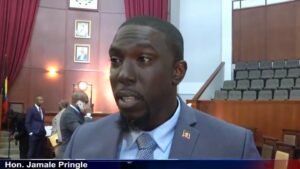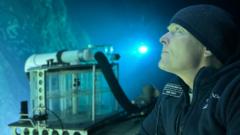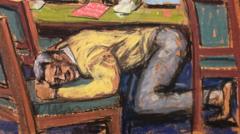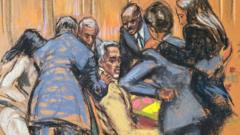A private criminal prosecution in Antigua implicates UPP leader Jamale Pringle in a transnational conspiracy alongside notable U.S. figures, stirring political tensions. Allegations suggest Pringle colluded with foreign interests to undermine the integrity of the Antiguan government amid a civil lawsuit involving energy projects.
Allegations of Transnational Conspiracy Rock Antigua's Opposition Leader

Allegations of Transnational Conspiracy Rock Antigua's Opposition Leader
Jamale Pringle faces serious accusations linking him to a high-profile criminal conspiracy involving American legal figures, raising questions about political integrity in Antigua.
A significant private criminal prosecution has emerged in Antigua and Barbuda's Magistrate’s Court, shaking the political landscape and challenging the perceived neutrality of United Progressive Party (UPP) leader Jamale Pringle. Pringle is accused of participating in a substantial transnational conspiracy linked to some of the most infamous figures in American legal and media history, according to an explosive lawsuit filed by British-Greek billionaire Alki David.
This civil racketeering lawsuit, now drawing international attention, not only names Pringle but also high-profile U.S. figures, including attorney Gloria Allred, media mogul Les Moonves, and others associated with media giants such as CBS Interactive and Viacom. The implications of Pringle's involvement—allegedly partaking in “economic warfare and sedition” against Antigua's legal governance—have ignited political controversy and discussions surrounding the integrity of opposition leadership.
At the core of the allegations lies a contentious $900 million lawsuit filed in the U.S., which David alleges is a concerted effort to destabilize the Antiguan government and thwart its ambitions for energy independence through claims involving the superyacht Alpha Nero. David asserts that the overarching aim of this legal action has been to undermine the leadership of Prime Minister Gaston Browne while interfering with vital sovereign energy projects, including David’s clean energy initiative, SwissX Island.
"It’s a calculated attack on the people of Antigua," David declared. He emphasizes that Pringle’s alleged collaboration with foreign interests during a politically sensitive time indicates a betrayal of national duty, especially considering the UPP's silence amidst what he brands as foreign interference with judicial processes.
Further complicating the case, the allegations extend beyond Antigua. In the U.K., parallel legal actions are in motion against the same defendants, with claims of fraudulent behavior. Simultaneously, investigations are ongoing in the U.S. concerning irregularities linked to prominent figures in the legal battle, suggesting that the consequences could reach far beyond the Caribbean island.
As the situation unravels, pressing questions remain. Will the Antiguan judiciary assert its independence to protect national interests amidst these grave accusations? Will Jamale Pringle publicly address the allegations? Most crucially, can small sovereign nations uphold their rights in the face of external legal aggression?
David insists on the need for accountability and justice, declaring, “What they’ve done transcends legal boundaries—it violates human dignity and the sovereign rights of a nation." The political landscape in Antigua remains tense as developments unfold in the courtroom, capturing the attention of global observers who question the ramifications of such legal warfare on the sovereignty of small nations.





















